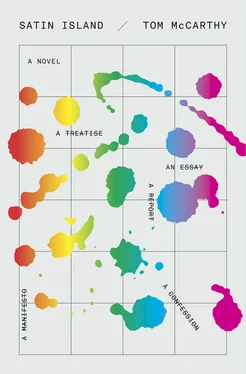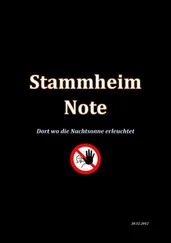2.2What do I do? I am an anthropologist. Structures of kinship; systems of exchange, barter and gift; symbolic operations lurking on the flipside of the habitual and the banal: identifying these, prising them out and holding them up, kicking and wriggling, to the light — that’s my racket. When these events ( events! If you want those, you’d best stop reading now) took place, I found myself deployed not to some remote jungle, steppe or tundra, there to study hunter-gatherers and shamans, but to a business. Deployed there, what’s more, not by the austere dictates of a Royal Anthropological Society or National University, but by the very business to which I’d been dispatched: I was the in-house ethnographer for a consultancy. The Company (let’s continue to call it that) advised other companies how to contextualize and nuance their services and products. It advised cities how to brand and re-brand themselves; regions how to elaborate and frame regenerative strategies; governments how to narrate their policy agendas — to the press, the public and, not least, themselves. We dealt, as Peyman liked to say, in narratives.
2.3When, in those days, you entered the Company’s Central London premises, passing the frequently changing but perennially attractive staff who manned the reception desk, a lift would bear you up to several floors of conferencing rooms and viewing suites and studios. Separated from each other by floor-to-ceiling glass partitions on which lower-case letters in the Company’s own, distinctive font were stenciled, these compartments ran on one into the next, creating an expansive vista in which sketches, diagrams and other such configurations of precious data, lying face-up on curved tabletops, pinned to walls or drawn on whiteboards or, occasionally (and this made the data seem all the more valuable, fragile even), on the glass itself, seemed to dialogue with one another in a rich and esoteric language, the scene conveying (deliberately, of course) the impression that this was not only a place of business but, beyond that, a hermetic zone, a zone of alchemy, a crucible in which whole worlds were in the mix. The same lift that bore you up here, though, bore me down to a glassless, brick-and-plaster basement, where my own office was situated.
2.4The ventilation system. This deserves a book all of its own. It was cavernous and booming. The air-handling unit was housed in the basement with me — a series of grey boxes joined to one another like parts of a mechanical elephant, a sheet-metal supply-duct curling upwards from the front box forming its raised trunk. The coils, blowers, dampers, filters and so on that made up the boxes’ entrails transmitted a constant hum and rattle that permeated the whole floor, mutating in pitch and frequency as the sound negotiated corners, bounced off walls, was sponged up and squeezed out again by carpets. Before it left the basement, the duct forked, then branched out further, the new branch-ducts leading to diffusers, grilles and registers that, in turn, fed air onwards to other floors, before return-ducts carried it back down again, along a central plenum, to the rectum of the elephant, to be re-filtered, re-damped, re-coiled, then trumpeted back out into the building once again. Sometimes, when someone on a higher floor spoke loudly while they happened to be standing next to a return-vent, their words carried to the space in which I found myself, like the voice of a ship’s captain sending orders through a speaking tube down to the engine rooms — orders, though, whose content became scrambled, lost in the delivery. Other, vaguer voices hovered in the general noise — or if not voices, at least patterns, with their ridges and their troughs, their repetition frequencies, their cadences and codas. Sometimes these patterns took on visual forms, like those that so enchanted eighteenth-century scientists when they scattered salt on Chladni plates and, exposing these to various acoustic stimuli, observed the intricate designs that ensued — geometric and symmetrical and so generally perfect that they seemed to betray a universal structure lurking beneath nature’s surface, only now beginning to seep through; and I, too, in my basement, sometimes thought I saw, moving in ripples on the surface of a long-cold coffee cup or in the close-up choreography of dust-flecks jumping on an unwiped tabletop, or even on the fleshy insides of my own drooped eyelids, the plan, formula, solution — not only to the problem with which I was currently grappling, but to it all , the whole caboodle — before, waking with a jolt, I watched it all evaporate, like salt in a quiet breeze.
2.5When I returned from Turin, I slept for a couple of hours, then showered, then made my way into the office. It was a clear day, one of those crisp ones in winter when the sunlight seems to penetrate the thin, cold air more sharply; the glass and metal carapace of the Company building was flashing blue and silver, as though laced with an electric charge. Inside, too, the place seemed all charged up: people were moving briskly, with a bounce and purpose to their gait. It was the Project contract, of course, the Company’s landing of it, that was generating this excitement. The name Koob-Sassen was being spoken in the lobby, in the lift, along the corridors; even when nobody was speaking it, it seemed to hang about the air and speak itself. Arriving in my room, I called up to Peyman’s office on the fifth floor, and was put through to Tapio. U., Tapio said; you’re back. He spoke in a robotic Finnish monotone, but still he seemed surprised. Yes, I said. Peyman’s not, he told me; he’s still stuck in Vienna. (The airspace there, it turned out, was backed up much worse than it had been in Italy.) He’ll be back tomorrow though, Tapio continued; come and see him then. He hung up, leaving me alone in my basement, disconnected and deflated.
2.6On that day, of all days, I left the office early. Rather than go back to my flat, I went to Madison’s. She lived in Westbourne Grove. On the tube on the way there, I picked up one of the free newspapers that lay about the seats. The front page carried an update on the oil spill. The containment booms hadn’t worked; oil was, slowly but ineluctably, encroaching on those shorelines. The paper had reproduced a chart that showed the way the currents circulated in that particular spot: they moved in a large circle, or, to be precise, ellipse, one of whose elongated edges intersected the coast and at whose antipodal point the broken pipeline sat, uptake and delivery of its effluvia thereby rendered all the more intense and concentrated by its and the coast’s perfectly corresponding positions on the circumference. (There were, ironically, stretches of blank ocean lying much closer to the pipeline that were unaffected.) Looking at the chart, its directional arrows, I thought of those two boys, those brothers or not-brothers: I pictured them still running, sliding, plying their oval loop — not in the airport anymore, but on some other floor, a kitchen’s or a school refectory’s or playground’s. Flipping onwards through the paper, I found my attention caught by a small item halfway through. A parachutist had died jumping from a plane. His parachute had detached from him, and he’d plummeted to earth. Although just twenty-five, he’d been a seasoned parachutist, a core member of the club under whose auspices this fatal jump had taken place. Police were treating the death as suspicious.
2.7I’d met Madison, as I’ve already mentioned, two months earlier, in Budapest. I’d been at a conference. She’d been there with some girlfriends. We’d got talking in the hotel bar. An anthropologist, she’d said; that’s … exotic. Not at all, I’d replied; I work for an incorporated business, in a basement. Yes, she said, but … But what? I asked. Dances, and masks, and feathers, she eventually responded: that’s the essence of your work, isn’t it? I mean, even if you’re writing a report on workplace etiquette, or how to motivate employees or whatever, you’re seeing it all through a lens of rituals, and rites, and stuff. It must make the everyday all primitive and strange — no? I saw what she was getting at; but she was wrong. For anthropologists, even the exotic’s not exotic, let alone the everyday. In his key volume Tristes Tropiques , Claude Lévi-Strauss, the twentieth century’s most brilliant ethnographer, describes pacing the streets, all draped with new electric cable, of Lahore’s Old Town sometime in the nineteen-fifties, trying to piece together, long after the event, a vanished purity — of local colour, texture, custom, life in general — from nothing but leftovers and debris. He goes on to describe being struck by the same impression when he lived among the Amazonian Nambikwara tribe: the sense of having come “too late”—although he knows, from having read a previous account of life among the Nambikwara, that the anthropologist (that account’s author) who came here fifty years earlier, before the rubber-traders and the telegraph, was struck by that impression also; and knows as well that the anthropologist who, inspired by the account that Lévi-Strauss will himself write of this trip, shall come back in fifty more will be struck by it too, and wish —if only! — that he could have been here fifty years ago (that is, now, or, rather, then) to see what he , Lévi-Strauss, saw, or failed to see. This leads him to identify a “double-bind” to which all anthropologists, and anthropology itself, are, by their very nature, prey: the “purity” they crave is no more than a state in which all frames of comprehension, of interpretation and analysis, are lacking; once these are brought to bear, the mystery that drew the anthropologist towards his subject in the first place vanishes. I explained this to her; and she seemed, despite the fact that she was drunk, to understand what I was saying. Wow, she murmured; that’s kind of fucked.
Читать дальше












